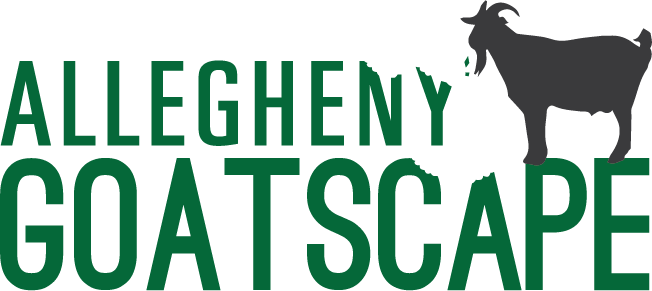Frequently Asked Questions about Allegheny GoatScape and its operations.
-
There are a few plants found in our landscapes that are toxic to goats. Some plants such as snakeroot and milkweed, are common and the goats avoid. Others, such as poison hemlock, yew or azalea, will be removed by AGS staff prior to the goats’ arrival, or completely avoided due to their prevalence and poisonous properties.
-
Goats DO eat poison ivy! Actually, many wild animals eat poison ivy as well, including deer, bears, turkeys, crows and raccoons. Goats have special gut enzymes that break down the oil found on all parts of the plant that give humans fits. The issue is that the goats may get the oils on their coats while eating and when humans touch the goats, they may get it.
-
Except for special events, AGS asks that community members not pet or feed the animals while working. Trained volunteers have learned proper care and are allowed to be with animals on site.
-
AGS has a miniature donkey in each herd: Sunshine, Hobo, Diamond and Pete. We have donkeys as a protective measure to keep the goats safe. Hobo came with the first herd and we purchased the following donkeys to continue the trend. Donkeys are herd animals just like goats, and serve as protectors of a herd from perceived threats such as coyotes. (They have a natural dislike of canines). Mini donkeys can eat many of the varied plants that goats eat, though their favorites are grasses. Farms, dairies and homesteads may use donkeys or other pack animals such as llamas, alpacas and dogs to protect goats and other animals.
-
Goats come in all shapes sizes and colors. The breeds represented in our herds include: Nubian, Alpine, Nigerian dwarf, La Mancha, Boer and Saanen, as well as some crosses. Some goats have beards, while others do not, and it is not related to gender. Some goats grow horns, while others do not. AGS goats, as a rule do not have horns. There are a few who were born to grow horns but they were disbudded soon after birth, inhibiting their growth We do not have horned goats out of safety for other goats, the fencing we use, and the fact that the City of Pittsburgh does not allow horned goat ownership within City limits.
-
When the weather gets cold and there is no longer any green vegetation in the landscape, the herds are taken to shelters with room to roam and provided hay, grains and open water until there is opportunity in the spring to once again get back out mitigating vegetation. Each herd is kept separate in their respective location. Goats are hearty and are able to withstand extreme heat and cold, but it is important that they have dry shelter out of wet winter weather.
-
Although possible, it is entirely unlikely that a goat herd will escape their fenced area on their own accord. If they do escape, it is because a deer has run through the fence first and pulled a significant amount down, or the power was accidentally left off (and they know the power is off) and some food proved to be too tempting on the outside of their area. While goats are incredibly inquisitive creatures, they have been trained on the fence and learned quickly that the fence wasn’t worth messing with.
-
We keep our calendar about where the goats are working up to date. Check out our current projects and updated locations here.
